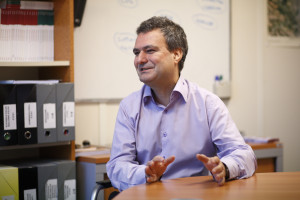Arnaud Bringé
tells us about INED’s Statistical Methods Service

Arnaud Bringé heads INED’s Service des Méthodes Statistiques (SMS). He specializes in quantitative social science methods, duration models and multilevel analysis. He has also been working for the last several years on social network analysis methods.
(Interview conducted in November 2011).
Why does INED need a statistical methods service?
The Service des Méthodes Statistiques provides methodological and technical support to INED research teams for analysing their data files. Analysing the questions that arise in research projects requires efficient tools, data-processing tools, of course, but also methodological tools for modelling and identifying the determinants that foster this or that type of behaviour. Researchers use multiple data sources, including INED-designed surveys, surveys analysed in the framework of an agreement with a partner institute, retrospective surveys that identify the important family or work-related events in individuals’ lives, series of interviews that are preliminary or complementary to a quantitative survey, masses of data used to identify major behavioural trends, international data that can only be analysed and compared if the model takes into account the different contexts that produced them. All these data are distributed into different categories: longitudinal (cohort studies), life course (chronologically ordered descriptions of the important events in individual lives), geographical, textual (interviews, open survey questions) and historical (parish registries).
What means do you use to achieve your objectives?
The focus of our partnership with the Institute’s research teams is the research project. Whether it’s a key project or a more narrowly focused individual project, the research project is the context in which we apply our expertise to help answer a set of research questions. Our participation goes beyond implementing statistical techniques: the service accompanies the research project. In addition to doing studies to determine the best methods for resolving a given social science problem, we try to identify commonly raised questions specific to the various groups who use our expertise in statistical methodology. To do so the Service hold training sessions in the various tools and methodologies, usually reserved for INED researchers and personnel though these days many research projects are carried out with international teams in a multidisciplinary framework.
Can you tell us something about the Service’s applied statistics seminar?
For the last four years we have been holding an annual seminar on a given methodology or type of data (longitudinal, spatial, etc.) in which colleagues using applications in related disciplines (geography, epidemiology, economics and the humanities) present their work. All social science actors are eligible to enrol in the seminars, which aim to provide an overall view of the possibilities offered by specialized statistical methods. Our objective is for researchers to recognize usefulness of these methods, become aware of the questions involved in using them (this in turn leads to understanding user choices), and ultimately desire to apply them in their own work.
